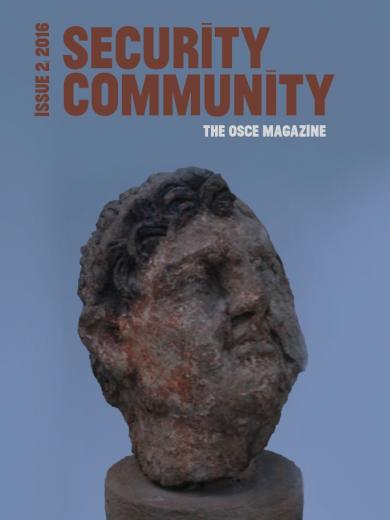The OSCE Academy in Bishkek
By Bermet Sarlykova and Pal Dunay
There is a unique OSCE educational project in Central Asia: the OSCE Academy in Bishkek. It was established in 2002 upon the initiative of Kyrgyzstan to promote regional co-operation in a part of the OSCE region where exchange and rivalry continue to go hand in hand. Over the years, its activity has gradually expanded in accordance with needs. Two Master of Arts (MA) programmes, in Politics and Security and in Economic Governance and Development, are complemented by shorter, tailor-made courses for professionals and dialogue with politicians, diplomats and experts.
The past year was particularly busy, as the foundations of the Academy had to be renewed. The Memorandum of Understanding that formalized the creation of the Academy in 2004 was redrafted in line with new developments and re-signed by the OSCE Chairperson-in-Office, German Foreign Minister Frank-Walter Steinmeier, and his Kyrgyz counterpart, Erlan Abdyldaev, on 31 March 2016.
The Academy’s Charter, adopted by the Board of Trustees, was approved by the Kyrgyz Republic’s Ministry of Justice and a new certificate of state registration as a legal entity was issued. The two MA programmes received new licenses and accreditations from the Ministry of Education and Science, guaranteeing the future of the OSCE Academy for several years to come. Kyrgyzstan supports the OSCE Academy in a variety of ways, among others by providing the Academy’s premises free of charge.
Highest number of applicants ever
For the 2016/2017 academic year, the OSCE Academy received 1,194 applications from potential students, the highest number ever. Thirty-two students (16 women) were accepted for the Politics and Security programme and 25 (9 women) for Economic Governance and Development.
Most students come from Central Asia. Since 2009 there are students from Afghanistan, an OSCE Partner for Co-operation, and lately also from the newest OSCE participating State, Mongolia. By 2016, the OSCE Academy had 331 graduates, 185 female (including seven from Afghanistan) and 146 male. The number of women at the Academy’s courses regularly exceeds men. This is very important in a region where women work extremely hard to achieve their best often under not fully favourable conditions.
Conferences and research
The OSCE Academy hosts an annual security conference, held seven times so far. Regional and extra-regional experts engage in frank discussions about regional security matters in accordance with Chatham House rules. In 2014 the Academy also hosted an academic conference. Selected papers will soon be published in the peer-reviewed journal, Central Asian Survey. Another conference, Post-Communism 25+ in Central Asia, is planned for 6 October 2016 in Issyk Kul, Kyrgyzstan.
The OSCE Academy promotes the research of young experts, including its graduates. Since 2014 the Central Asian Policy Briefs have been published on a monthly basis. Most of their authors are young Central Asian experts who work in the region.
Opportunities
The OSCE Academy offers its graduates a variety of internships and fellowships. Under the Junior Public Officers Programme, established in 2010, students who graduated with an MA in Politics and Security can intern at the Ministries of Foreign Affairs of Kyrgyzstan, Kazakhstan, Tajikistan and Afghanistan. Since 2016, Kyrgyz graduates of the Economic Governance and Development programme can intern in the Ministry of Economy’s Investment Promotion Agency.
The OSCE Academy and the OSCE Parliamentary Assembly (OSCE PA) signed a Memorandum of Understanding on 10 August 2016 providing one graduate annually a six-month research fellowship at the OSCE PA’s Secretariat in Copenhagen. Other opportunities for graduates include scholarships at the Geneva Centre for Security Policy and research fellowships at the Norwegian Institute of International Affairs.
Alumni update
According to data gathered from the annual alumni survey and additional investigations, 71 per cent of OSCE Academy alumni live and work in Central Asia and in Afghanistan. Eighty-two per cent are employed; 22 per cent in senior positions. Many employed alumni are building their careers in international organizations, followed by the private sector, education and research, the public sector and non-profit organizations.
Finance
The OSCE Academy’s annual budget of less than a million Euro is allocated and spent with great care. Almost 20 per cent comes from the OSCE’s Unified Budget, demonstrating the continuing commitment of the 57 participating States.
Bermet Sarlykova is Communications Co-ordinator and Pal Dunay is Director of the OSCE Academy in Bishkek.
Read more:
Visit the OSCE Academy website: osce-academy.net
Central Asia Policy Briefs are available here: osce-academy.net/en/research/policy-briefs/
Welcome to Security Community
Security Community is the OSCE’s online space for expert analysis and personal perspectives on security issues.
The views expressed in the articles are those of the authors and do not necessarily reflect the official position of the OSCE and its participating States.


